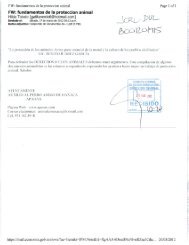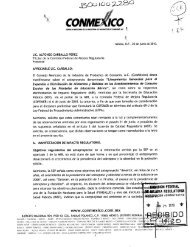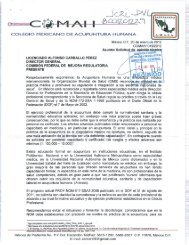Untitled
Untitled
Untitled
You also want an ePaper? Increase the reach of your titles
YUMPU automatically turns print PDFs into web optimized ePapers that Google loves.
S136<br />
increase in the ratio of total low-density lipoprotein<br />
cholesterol to high-density lipoprotein cholesterol and an<br />
increase in triglycerides. This may apply particularly to<br />
overweight and obese individuals who are insulin-resistant.<br />
A low-dietary GL may reduce the risk of type II diabetes and<br />
cardiovascular disease but similar caveats to those described<br />
for GI apply when interpreting such observations.<br />
Carbohydrates in the treatment of diabetes and<br />
cardiovascular risk factors<br />
Similar issues to those described above relating to dietary<br />
carbohydrate and disease prevention apply to the management<br />
of people with diabetes and to those with risk factors<br />
for cardiovascular disease, especially to those with abnormal<br />
lipid profiles. While legumes, pulses and certain fruits,<br />
vegetables and cereal grains appear to confer particular<br />
benefit in terms of reducing glycaemia and lowering lowdensity<br />
lipoprotein cholesterol, difficulties of measurement<br />
and the possibility that other constituents of plant foods<br />
may be involved preclude the definitive conclusion that the<br />
content of ‘soluble’ dietary fibre is the determinant of this<br />
effect (Mann, 2007). Low-GI foods may confer benefits in<br />
terms of improving glycaemic control in people with<br />
diabetes. However, it is not clear whether these benefits are<br />
fully independent of the effects of dietary fibre or the fact<br />
that foods with intact plant cell walls tend to have low GI.<br />
Furthermore, it is uncertain whether functional and manufactured<br />
foods with a low GI confer the same long-term<br />
benefits as low GI predominantly plant-based foods.<br />
Cancer<br />
The review relating to cancer concluded that the most<br />
frequently observed association with carbohydrates was that<br />
between low intakes of dietary fibre and increased risk for<br />
colorectal cancer. However, it was noted that the data were<br />
not entirely consistent. The possible links between high<br />
intakes of sucrose and colorectal cancer and high intakes of<br />
lactose and ovarian cancer were considered to be rather more<br />
tenuous. The link between obesity and several cancers was<br />
considered to be convincing (Key and Spencer, 2007), thus,<br />
nutritional determinants of obesity may be regarded as<br />
causally related to all obesity-related cancers. Key and Spencer<br />
(2007) noted that the World Cancer Research Fund Report<br />
(WCRF) on Diet and Cancer to be published in November<br />
2007 was likely to generate more definitive data on nutritional<br />
determinants of cancer than had previously been available.<br />
Discussion<br />
The Scientific Update has enabled us to draw a number of<br />
important conclusions. The importance of improving the<br />
definition of dietary fibre was discussed and it was agreed<br />
European Journal of Clinical Nutrition<br />
Scientific Update on carbohydrate in human diet<br />
J Mann et al<br />
that the definition should be based on well-established<br />
health benefits and the ability to fulfill regulatory requirements.<br />
We, therefore, proposed that dietary fibre should be<br />
defined as intrinsic plant cell wall polysaccharides. Thus the<br />
method(s), which enable the measuring of the component<br />
polysaccharides would be appropriate for determining dietary<br />
fibre as defined above. The three food energy systems<br />
currently used in food tables and for labelling continue to<br />
create confusion for the consumer. There is an urgent need<br />
for an internationally agreed readily understood system, and<br />
further consideration of the net metabolizable energy<br />
approach is suggested. Review of the recent literature<br />
endorses the recommendations of the 2002 WHO/FAO<br />
Expert Consultation concerning the restriction of beverages<br />
high in free sugars and the limitation of total intake of free<br />
sugars to reduce the risk of overweight and obesity. The<br />
positive messages of that consultation are also endorsed,<br />
notably the potential of whole-grains, legumes, vegetables<br />
and intact fruits to protect against diabetes and cardiovascular<br />
disease. Many of these foods, high in dietary fibre, help<br />
to improve glycaemic control in people with diabetes and to<br />
reduce cardiovascular risk factors. However, while foods with<br />
a low GI may also confer benefit in some of these contexts,<br />
the Scientific Update suggested caution regarding the use of<br />
the GI as the sole determinant of the quality of carbohydrate-containing<br />
foods. Given the association between<br />
obesity and cancer at several sites and the possibility that<br />
dietary fibre may reduce the risk of colorectal cancer, the<br />
dietary messages aimed at reducing the risk of obesity,<br />
diabetes and cardiovascular disease have the potential to also<br />
reduce cancer risk.<br />
Finally, the need to review the current recommended<br />
range for dietary carbohydrate intake (55–75% total energy)<br />
was identified. There appeared to be insufficient justification<br />
for the recommended lower limit, therefore a possible<br />
revision to 50% was suggested. A wide range of intakes, as<br />
a proportion of total energy intake, is compatible with low<br />
risk of chronic diseases although excess intake of any<br />
macronutrient is likely to lead to obesity. The nature of<br />
dietary carbohydrate appears to be a more important<br />
determinant of health outcomes than the proportion of<br />
total energy derived from carbohydrate intake. It is hoped<br />
that these papers will stimulate discussion among the<br />
scientific community and relevant health professions and<br />
inform the formal Expert Consultation on Carbohydrate to<br />
be convened in the foreseeable future.<br />
Conflict of interest<br />
During the preparation and peer-review of this paper in 2006,<br />
the authors and peer-reviewers declared the following interests.<br />
Experts<br />
Professor John Cummings: Chairman, Biotherapeutics<br />
Committee, Danone; Member, Working Group on Foods<br />
with Health Benefits, Danone; funding for research work at<br />
the University of Dundee, ORAFTI (2004).
















